Insights
Stockport Council to create ‘Merseyway Innovation Centre’ giving a boost to local businesses
Stockport Council has announced plans for a new state-of-the-art innovation centre in the heart of Stockport Town Centre.
The new site, which will be named the Merseyway Innovation Centre will be a 15,000-square-foot space on the upper floors of the Merseyway Shopping Centre, which is currently vacant.
That space will now be transformed into a flexible serviced office and co-working accommodation.
Due to open in Summer 2023, the Innovation Centre will transform the first floor of the former Next store and the adjacent former Metro Gym into a fantastic new hub for start-up businesses and entrepreneurs. At full capacity, the Innovation Centre has the potential to accommodate up to 50 new businesses right in the heart of Merseyway.
Stockport Council says this will offer a ‘thriving Innovation Centre where fledgling and small businesses will be supported in their growth plans in a centrally located, flexible and inspirational environment.’
They believe it will be another vital cog which is helping to regenerate the area, as numerous plans continue apace.
Some of the facilities at the new centre include:
- Business lounge – a meeting area, providing opportunities for collaboration and development of the MIC business community
- Co-working space – bookable desks for small and micro businesses or individuals working remotely. A first step for growing a new business
- Business units – shared and individual offices with between one and four desks per office, aimed at new and young businesses requiring “incubation” space and support
- Grow on space aimed at more established businesses with between 4 and 10 employees
- Meeting rooms
- All customers will also have access to business support and a programme of workshops and networking opportunities delivered from the centre
- Ultra-fast broadband
The Innovation Centre supports the Council’s investment into diversifying the town centre, attracting a wide range of people, whilst also repurposing former retail units.
The scheme is funded by the European Regional Development Fund, Government funds and Stockport Council. Support from the Arts Council England’s Cultural Development Fund will enhance the digital creative offer.
Cllr Colin MacAlister, Cabinet Member for Economy and Regeneration at Stockport Council, said: “We have a thriving business community in Stockport but this will strengthen our offer and provide that all-important support for new and small businesses, providing everything they need for their business to grow and prosper.
“The improvements we are making to the wider Merseyway Shopping Centre will further enhance the area and the new Transport Interchange just across the road will make it even more accessible, allowing more people to take advantage of the fantastic facilities and all our town centre has to offer.”
Work will include the construction and fit-out, as well as renovation work to the façade.
It is set to be undertaken by local contractor TMT commercial, who are Stockport based.
TMT will track carbon emissions to and from the site and collect data from waste removal to target less than 0.5% to landfill.
Further added value from the project will see TMT spend 80 hours of voluntary time to support local community projects, make donations to local sports teams and assist Stockport Women’s Centre in the refurbishment of some of their space used to support local women.

Manchester rated ‘Excellent’ by UNESCO as a Creative City Of Literature
Manchester has been rated ‘Excellent’ in all categories by UNESCO after submitting its first report since becoming a City of Literature – a unique achievement among the prestigious group of global cities.
In 2017 Manchester was successful in its bid to join UNESCO’s worldwide Creative Cities network as a City of Literature, which recognised the significant contribution of literature to the city.
To maintain a UNESCO Creative Cities designation, every four years a detailed report for each city is submitted for assessment. Manchester’s first report covering 2017-2021 was submitted to UNESCO last year.
UNESCO said that Manchester’s report was “high quality, setting a good example for other cities to follow”.
The report praised Manchester’s:
- work to support vulnerable residents during the COVID-19 pandemic
- partnership approach and strength in literature development and the vitality its approach to multilingualism brings
- focus on benefits for residents
- commitment to poetry
- vibrant publishing sector
- Annual week-long Festival of Libraries
- active political involvement in the designation from Manchester City Council, and from the two universities.
- Manchester’s ambition in contributing to the United Nations 2030 Agenda for Sustainable Development.
Over the past five years, The University of Manchester has worked together with Manchester Metropolitan University, Manchester City Council and the city’s literary community to deliver a vibrant programme of events, showcasing Manchester’s talents and giving all of its residents the chance to participate in and benefit from the thriving City of Literature.
The city’s annual week-long Festival of Libraries was described by UNESCO as “a most impressive initiative… [attracting] great attention both locally and internationally”. The review noted the active political involvement in the City of Literature designation from both universities and Manchester City Council.
Being labelled as Excellent in all relevant categories comes as the city is gaining increasing recognition around the world for its cultural vibrancy. National Geographic included Manchester in its Best of the World 2023 selection and Manchester is the only UK city included in Lonely Planet’s Best in Travel 2023 list because of its learning and cultural developments.
Manchester also topped Conde Nast Traveller’s Best Places to Go in the UK in 2023 list, which praised the city’s improving sustainability, green space and culture while Time Out also listed Manchester as 4th in their best places to visit in the UK list.
Councillor Luthfur Rahman OBE, Deputy head of Manchester City Council, said “This is a fantastic achievement for the city and shows that we are investing in local talent and the cultural future of Manchester.”
Malcolm Press CBE, Vice Chancellor Manchester Metropolitan University said, “The designation has raised the profile of our City as a beacon destination for creative industries, cultural tourism and students of the arts and humanities, and established the reputation of its literature ecosystem as an exemplar of creative excellence and inclusivity”
Dame Nancy Rothwell, President & Vice-Chancellor said, “The UNESCO City of Literature designation has fostered a true ‘Manchester spirit’ of collaboration between our universities, the City and the city’s diverse literary communities. This report recognises that transformational work, and we are very proud of our staff and students’ contribution to a great literary, creative environment in what our colleague Professor Jeanette Winterson has called an “alchemical city” – Professor Dame Nancy Rothwell, Vice-Chancellor of The University of Manchester.

Jet2.com invests £8.5 million into new Training Centre near Manchester Airport
Jet2.com has opened a multi-million-pound training centre for air and ground crew near Manchester airport.
The £8.5 million new facility at Cheadle in Stockport, complements the leisure airline’s first training centre near Bradford, which opened in 2014.
The purpose-built new unit enables the carrier to underpin its growth ambitions by training thousands of staff every year, creating a dozen full-time positions for local people.
It will provide a bespoke centre of excellence for training new and current pilots, engineers, cabin crew and staff in ground operations.
The three-storey facility will house flight simulators, cabin crew trainer units, engineering training devices to enact real-life scenarios, high-tech computer-based training rooms, fully equipped classrooms and briefing rooms.
Jet2 says the training centre will “play a critical role” in ensuring that the carrier has sufficient numbers of highly-trained personnel to support the growth plan.
The opening follows sister tour operation Jet2holidays surpassing Tui as the UK’s largest Atol holder and comes as parent company Jet2 prepares for the introduction of a fleet of new generation Airbus A320/A321neo aircraft.
The group has 98 firm orders with Airbus, which could eventually extend up to 146 aircraft.
Jet2.com and Jet2holidays chief executive Steve Heapy said: “Today’s exciting announcement is the latest stage on our growth journey and is another demonstration of our commitment to investing in our successful business.
“This fantastic new facility complements our existing training centre and enables us to train and develop our award-winning teams as we grow, so that our flight deck, cabin crew, ground operations and engineering teams can continue to provide the first-class experience that our customers have come to know and love when they travel with Jet2.com and Jet2holidays.”
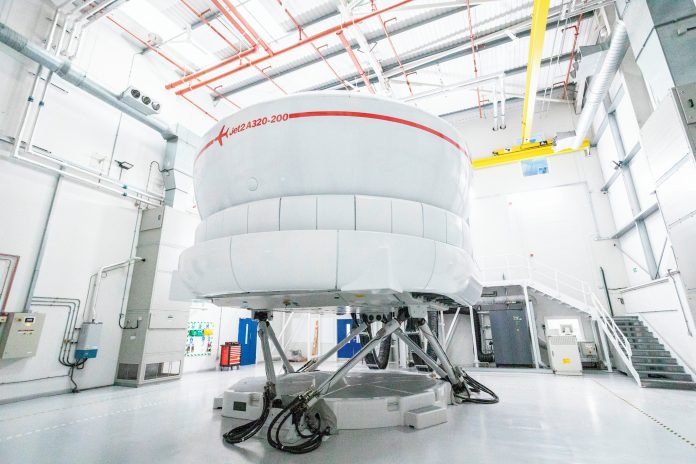
Event Round-Up: Audience with Greater Manchester and West Yorkshire Mayors on Advanced Machinery and Manufacturing
Mayor of Greater Manchester, Andy Burnham, and Mayor of West Yorkshire, Tracy Brabin, discussed the importance of advanced machinery and manufacturing in “reindustrialising” the North, with job creation, skills development and increased prosperity fuelled by innovation.
They were joined by business leaders from both regions as well as Dr Peter Thompson, CEO of National Physical Laboratory (NPL), the UK’s National Metrology Institute, at the event on Thursday 9 February.
NPL is a key partner in the Advanced Machinery and Productivity Institute (AMPI). AMPI will support the machinery manufacturing industry in the UK by enabling invention, innovation and the incorporation of digital technology and is set to establish a centre of excellence in Rochdale.
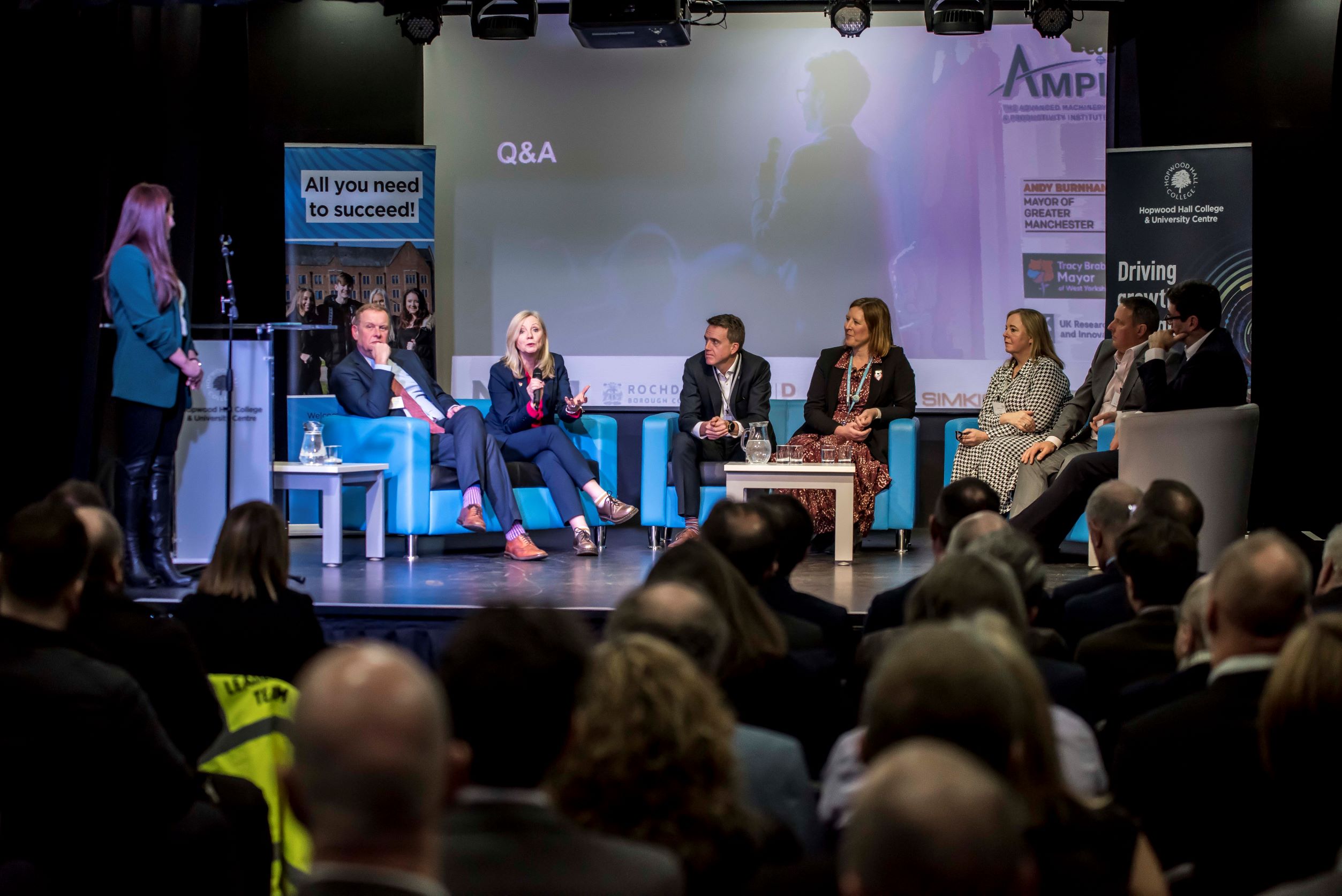

AMPI’s presence will be key to the development of an advanced machinery and manufacturing supercluster in Atom Valley – the plan for jobs, development and investment across Rochdale, Oldham and Bury led by a Mayoral Development Zone.
Councillor Neil Emmott, Leader of Rochdale Borough Council, opened the event, saying: “In our borough, cooperation is what we do best. By bringing together the very best of the manufacturing community and educational partners, both local, regional and national, AMPI will create hundreds of highly skilled, highly paid jobs on our doorstep.
“This is an unrivalled opportunity for our residents to be part of and I’m really proud of what’s been achieved so far. The importance of this incredible project cannot be overestimated. By bringing major organisations together in this way to pool the best skills, talent and resources from across the country, we have the power to create cutting edge technology, which will transform the manufacturing industry in a way that will have an impact far beyond our borough’s borders.”
Mayor of Greater Manchester, Andy Burnham, said: “If you go back a century this area was the powerhouse of the world – the first home of advanced manufacturing and machinery. We led the world and I see no reason why we can’t do exactly the same again.
“This is the best opportunity we will get to reindustrialise the North of England, but in a good way, a clean way that brings prosperity in the future. If we’re going to rise to that challenge it will require us to innovate, to bring forward new materials and ways of making things.
“I see Atom Valley as being right at the heart of that vision. If we go first we will bring forward the new technologies and develop our skills base. It will be built by a network of organisations and institutions like AMPI that are ready to go faster – that’s how the North of England rises again.”
Mayor of West Yorkshire, Tracy Brabin, said: “It’s about creating opportunities, accelerating innovation and driving forward the vision we share for a modern Northern economy.
“In West Yorkshire manufacturing is in our DNA. One in ten people in our region work in manufacturing, and this increases to one in five in areas like Dewsbury and Huddersfield. The sector contributes over £7.12bn of GVA to our region.
“Our regions enjoy a rich relationship with manufacturing that spans three centuries of progress. We are embracing machinery and technology to turbocharge manufacturing – not just in our region, but across the UK’s industrial landscape and beyond.”
Dr Peter Thompson discussed the funding opportunities for product development available to manufacturers in the region from a new £1.2m programme, Measurement 4 Business (M4B), which allows SMEs in the region to access the NPL specialist measurement expertise at no charge.
Dr Peter Thompson, CEO of NPL, said: “I believe our prosperity is deeply rooted in our ability to innovate. It’s exciting to be here at Hopwood Hall where many of the future innovators are learning the skills they will use to drive forward the future economy.
“We know there’s more we can do to enable innovative SMEs in Greater Manchester and West Yorkshire access our people and facilities. That’s why we’re launching the Measurement 4 Business programme here today.”
During a panel discussion, Paul Simkiss, Managing Director of Rochdale-based Simkiss Control Systems, and Mandy Ridyard, Director at Produmax, an aerospace components manufacturer based in Bradford, shared their insights and ambitions as leaders working in the sector.
Julia Heap, Principal and Chief Executive of Hopwood Hall College, discussed the crucial role skills development will have in the sector’s growth, while Gareth Edwards, AMPI Programme Director at NPL, gave an overview of AMPI’s work and details on the new funding available.
Paul Simkiss, Managing Director of Simkiss Control Systems, said: “We work with industrial companies throughout the country but we see all the time they’re buying advanced machinery overseas.
“That’s great when it’s brand new, but when it fails, they have problems with time zones, getting engineers, and it costs hundreds of thousands of pounds waiting for the machinery to come back online. They would welcome the opportunity to buy in the UK.”
Mandy Ridyard, Director of Produmax, said: “We export 70 per cent of what we make, but when we look at the productivity of the UK, we’re behind America, France and Germany. Not only that, but the energy cost is higher in the UK, meaning I need to increase my productivity to compete on a global stage.
“Anything that AMPI can do to help that is really welcome. As well as that, it can give a bigger voice to manufacturing in the UK. We need to make sure manufacturing is part of the narrative.”
Julia Heap, Principal and Chief Executive of Hopwood Hall College, said: “At Hopwood Hall we have around 3,200 16 to 18-year-olds studying this academic year across both campuses. We’re a technical vocational college – everything is around new T-Levels, BTECs and City and Guilds qualifications.
“We are investing just over £10m in our technology centre, providing up-to-date learning facilities and equipment, with staff equipped to support students on their next steps. We work with employers right from the outset to understand what their needs are and provide work experience for students. It’s important for Rochdale – we are a deprived borough and our students deserve the opportunity to work in high-level, well-paid jobs that help the community prosper.”
Gareth Edwards, AMPI Programme Director at NPL: “AMPI will give us a place and support across the nation for allowing companies to really innovate.
“We want to be the country people want to invest in and buy from, across next-generation machinery and materials. How are we going to make the materials? How are we going to turn those materials into something that gives the UK the edge, while realising our social and net zero ambitions? It’s going to come from machinery, because machinery is at the heart of everything we do.”
After the event, the Mayors were given a tour of Hopwood Hall College, meeting with students to learn about their studies and ambitions for the future.
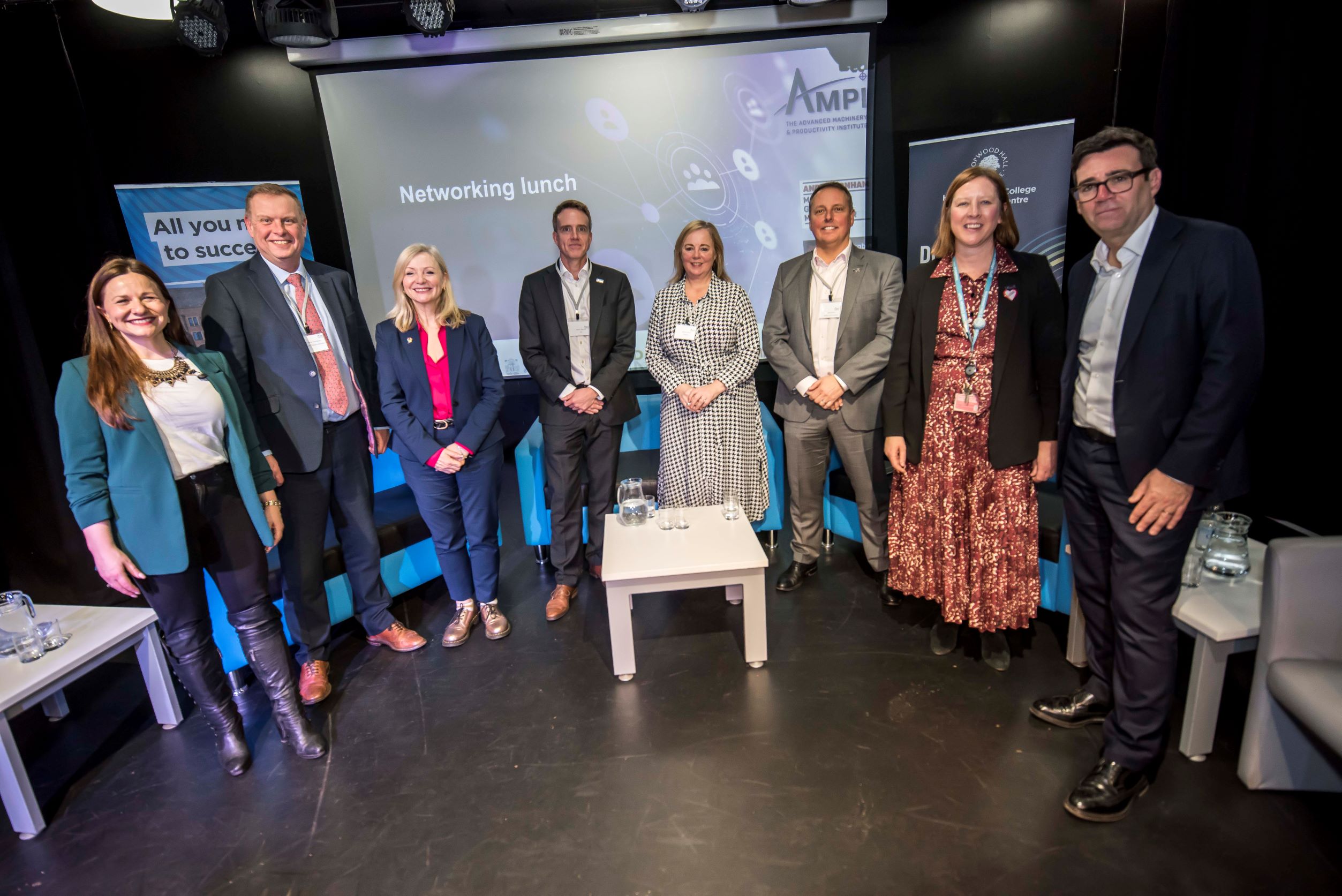

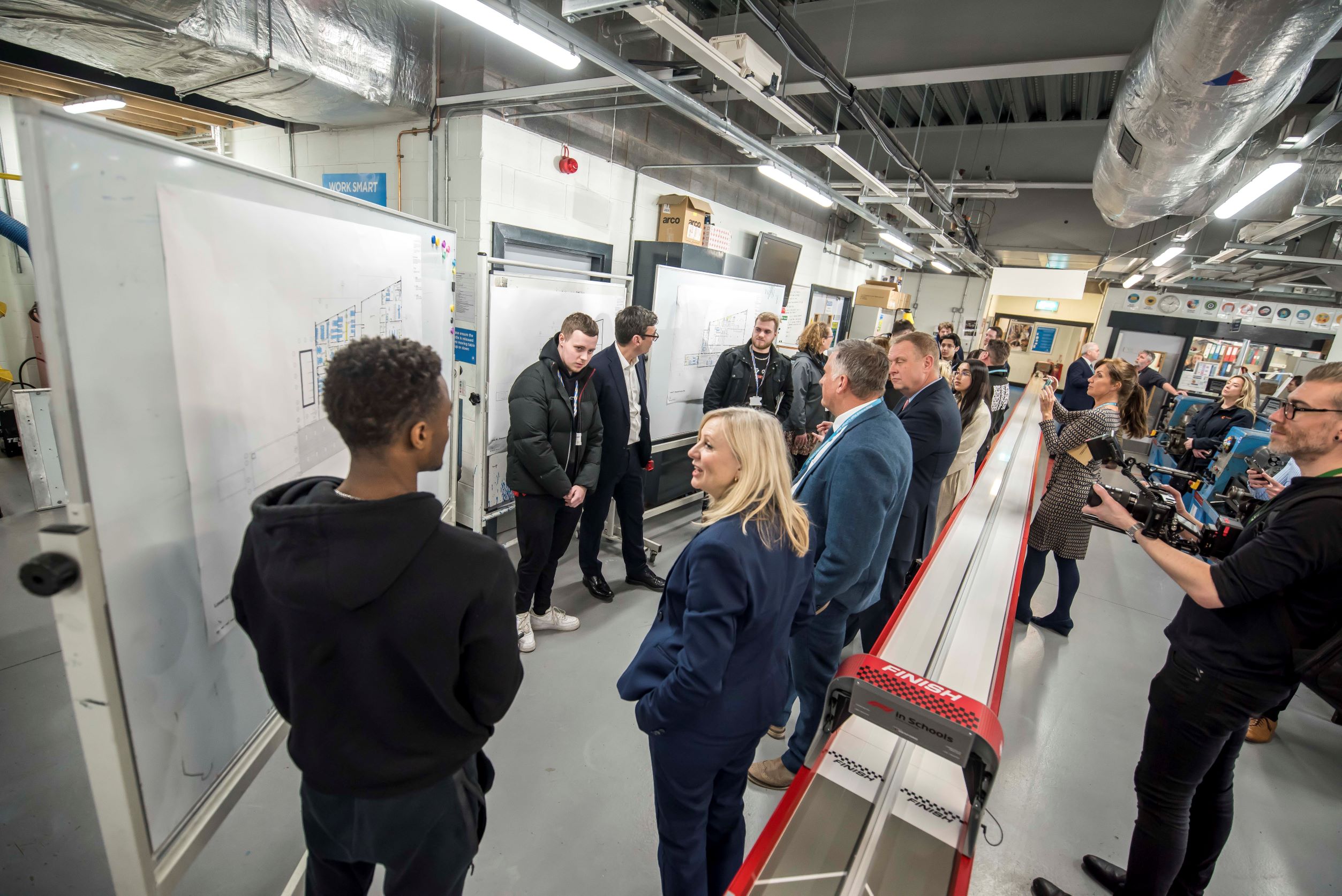
Event Round-Up: Insider Media’s Future of Greater Manchester: Insider Breakfast
Leading voices from across Greater Manchester gathered to discuss the potential of the city-region as part of Insider Media’s Future of Greater Manchester: Insider Breakfast.
As a city-region with a thriving business ecosystem, the event aimed to uncover what Greater Manchester can do to ensure it maintains momentum and grows further in 2023 and beyond.
Focusing on sustainability, connectivity and skills, panellists discussed how Greater Manchester can be a world-class region when it comes to transport, talent, investment and reaching its 2038 net-zero targets.
Opening the event, and giving an overview of Greater Manchester’s progress in each of these key areas was Eamonn Boylan, Chief Executive of Greater Manchester Combined Authority (GMCA).
Claiming that progress in transport, skills and the green agenda through Greater Manchester’s devolved powers were all essential to building a more prosperous city region, Boylan emphasised that the key to all of this is creating a fairer, more inclusive Greater Manchester in the future.
Eamonn Boylan, Chief Executive GMCA said “The fundamental objective of Greater Manchester is economic growth, but it has to be inclusive economic growth. It’s a complex agenda but it’s one we feel is worth the pursuit.”
On the skills agenda, he emphasised ”A key element of the skills agenda is not only looking at it from the employer perspective but from the employee perspective. The big priority that we’ve been pushing is how we build a better, more legible and more accessible vocational skills pathway for young people in the city region.
“I want to make certain that the dialogue with businesses is very direct and immediate to make sure business voices are heard and the skills agenda works around them, rather than trying to retrofit the skills needed afterwards.”
Then joining a panel session to discuss levelling up and these key areas for growth were Amy House, Director of Green Economy, Andrew Wilkinson, Chief Executive Officer, The University of Manchester Innovation Factory, Ian Austin, Managing Partner, Fieldfisher, Tim Newns, Managing Director for Levelling Up, Office for Investment and Melissa Wilson, Assistant Director, Real Assets Advisory, Deloitte.
On levelling up, Tim Newns, Managing Director for Levelling Up at UK Office for Investment says, “Levelling up is about driving up transformative investment. Not a singular investment but one that influences the region around it. Creating the cumulative effect that has ripples.
“The next challenge is to look at the big areas of demand globally on the service side and the industrial side. The country recognises Greater Manchester as having real strengths in AI and biotechnology for example, but how do we translate research into industrial applications or from the research lab into testing to high-value manufacturing?”
On development and skills Melissa Wilson, Assistant Director of Real Assets Advisory at Deloitte said, “This year there are around 57 construction sites in the city centre and Salford, 25 of those are new starts. There are increasing cranes in our towns. That’s a positive story.
“Manchester is and always has been a magnet for talent and we need to make sure we maintain that. Our corporates who have moved to Manchester need to invest in Manchester in the skills and talent space.”
On innovation, Andrew Wilkinson, Chief Executive Officer of The University of Manchester’s Innovation Factory said, “There’s an amazing amount of research that happens at the university of Manchester but it’s just research. It needs our team to turn that research into strategies, identify market opportunities and create spin-out companies.
“Researchers understanding business needs is important as the business needs can turn it into something real and useful for society. The innovation factory acts as a bridge between the business world, the University and the researchers to ensure a smooth transition.
It’s important for us to use innovation and the existing skillets to create a mixed economy. Our opportunity is to demonstrate to the rest of the UK how creating a mixed economy will increase our productivity and create high-value jobs.”
On sustainability and reaching net zero targets, Amy House Director of Green Economy and Bee Net Zero board member said “As innovation strives on, technology becomes more efficient, more affordable and easier to implement. The real innovation we need to talk about with businesses is getting them to change the way they do things and that behavioural change. We will never meet our climate targets unless we change our behaviours.
“Bee Net Zero is working to ensure that Greater Manchester is the easiest place for businesses to become net zero by offering them support, and guidance while connecting them with green tech.
“We know Greater Manchester is leading the way in so many areas but what I would like to see it lead the way in is helping businesses to be braver and making change happen quicker.”
The panel concluded that the future of Greater Manchester is looking positive, but bold steps need to be taken to truly level up and create a more sustainable, equal and prosperous city region.
While all speakers agreed that Greater Manchester has the talent, assets and infrastructure in place to create a city-region of the future, they also agreed that maximising homegrown talent and making the most of devolved powers to succeed.
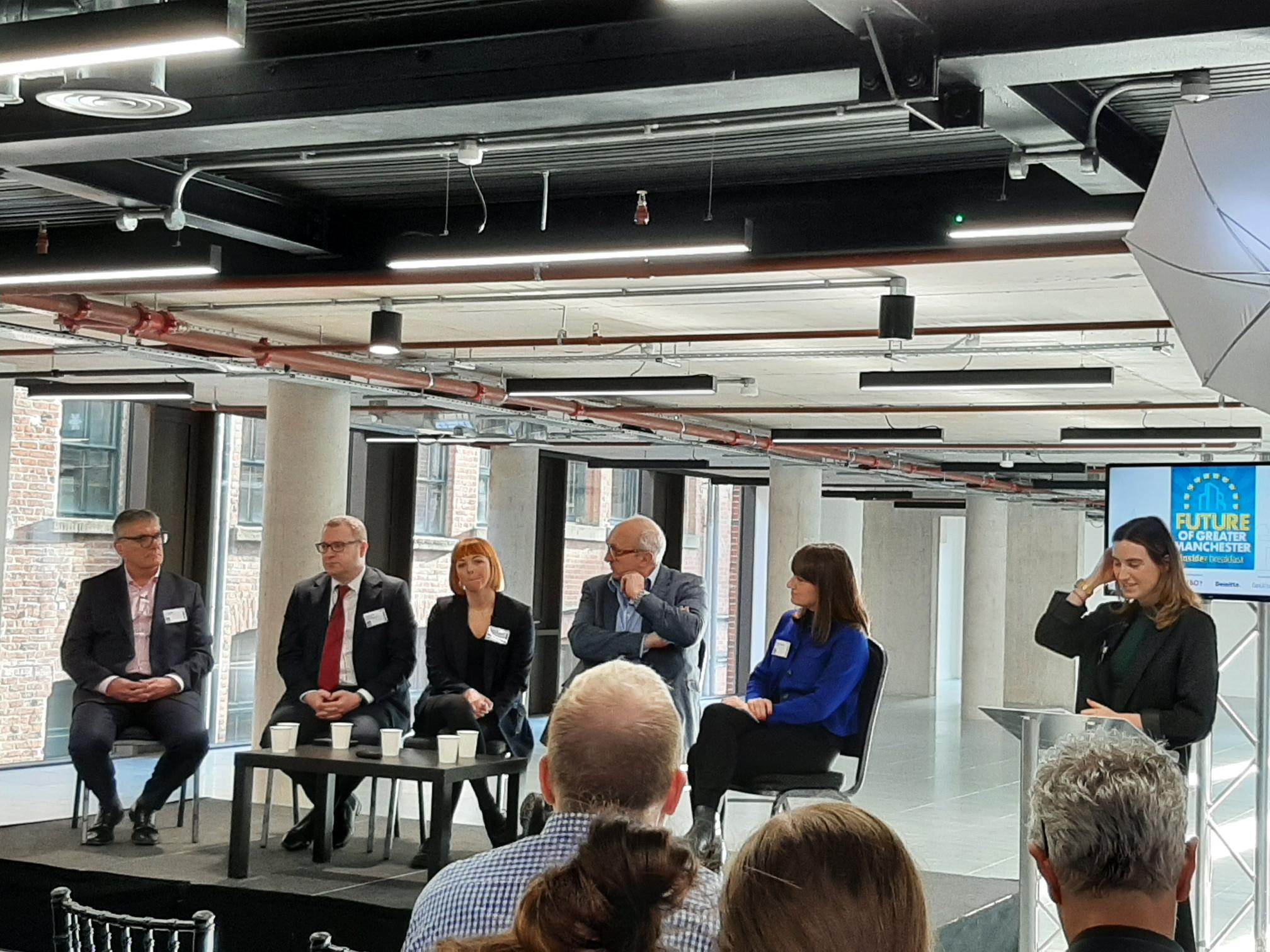
Greater Manchester Chosen to Develop a Regional Secure Data Environment (SDE) for Health and Care
Greater Manchester will receive funding from NHS England to begin the development of a sub-national Secure Data Environment for Research & Development, as part of a collaborative across the North-West. SDEs are intended to enable NHS data to be safely and securely accessed by researchers for population health research.
In early 2022, the Centre for Improving Data Collaborations in NHS England announced significant funding for the development of SDEs for research and development in England. Health Innovation Manchester, on behalf of Greater Manchester Integrated Care, led a single North-West Expression of Interest alongside Cheshire & Merseyside ICS and Lancashire and South Cumbria ICS. The North-West Expression of Interest has been successful, and work is underway to commence the activity to make the regional SDE a reality.
Secure Data Environments (formerly known as “Trusted Research Environments”) are highly secure computing environments that provide remote access to health data for approved researchers to use in health and care research that can save and improve lives. SDEs put virtual walls around data to ensure that users can only access data for which they are approved and provide secure access to analytical and statistical tools for conducting research. The GM Care Record (GMCR) will be one of the datasets that can be analysed through the SDE.
Throughout the COVID-19 pandemic, sharing of data into the GMCR accelerated significantly and was used to successfully deliver several research studies into the impact of COVID-19 on the Greater Manchester population by deploying a tactical “Trusted Research Environment”.
Since then, significant progress has been made to agree information governance arrangements across GM for the continued usage of this data for non-COVID purposes, including a single Joint Controller Agreement and pan-ICS Data Sharing Agreements signed by all data controllers. This has the potential for the SDE to answer deeper questions about the region’s health and care beyond the pandemic.
Bradley Quinn, Associate Director of Insight at Health Innovation Manchester, said:
“I’m incredibly excited to share the news about the funding secured for the North West SDE for Research and Development, a population of over 7m, across an entire NHS region. This is the start of something big, but also in many ways a continuation of the great work we have delivered, and will continue to, here in GM. We’re looking forward to working with our colleagues in Cheshire and Merseyside ICB and Lancashire and South Cumbria ICB to build a solution for collaboration across boundaries, and deliver high-impact R&D in the North”.
Claire Bloomfield, Deputy Director, Centre for Improving Data Collaboration at NHS England, said in a recent blog:
“ I’m thrilled to announce that, following foundational investment in 21/22, and a competitive process over this summer, we’ve awarded over £13.5 million funding that will support the development of an interoperable network of NHS-owned Sub National Secure Data Environments, with further investment planned over 23/24 and 24/25.
Sub-national SDEs for research will offer near-real-time, privacy-protecting, access to rich linked data spanning different types including imaging, pathology and genomics. They will operate at significant scale, covering around 5 million citizens each, whilst preserving connectivity to local communities and clinical teams”.
Work is underway in Greater Manchester to identify the “lighthouse” studies or use cases that will first make use of the SDE and prove its value to the GM health and care system. Further announcements will be made as these studies are identified and when the results of the studies are published. Permission for this use of patient information is also being sort through the NHS Health Research Authority’s Confidentiality Advisory Group.
Read more about the work in GM on SDEs in this blog from the project lead, Bradley Quinn.
Matt Hennessey, Chief Intelligence and Analytics Officer at Greater Manchester Integrated Care, and Bradley Quinn are speaking about how data is being used from the longitudinal record to accelerate innovation in Greater Manchester, including the development of the North-West SDE, at the HETT North event on 2nd March 2023.

